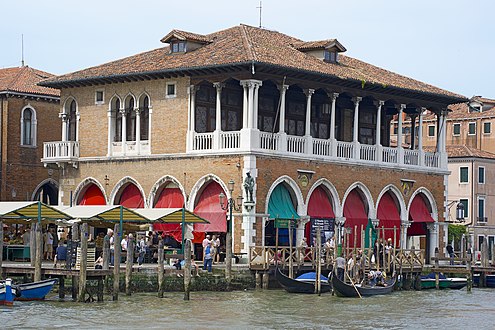Cesare Laurenti (November 6, 1854 – 1936) was an Italian painter.
Biography
Laurenti was born in Mesola, Ferrara. He moved to Padua at the age of 18 to work as an engraver under the guidance of the sculptor Luigi Ceccon. He was supported by the Count Leopoldo Ferri in this regard, and was able to meet the art critic Pietro Selvatica. In 1875, he married Annina Levi. In 1876, he moved to continue his training at the Accademia di Belli Arti in Florence. He arrived in Florence in 1876, and trained under Giuseppe Ciaranfi. He moved to Naples two years later and worked under Domenico Morelli. Having returned to Padua in 1881, he finally settled in Venice.
After early works of genre painting, he developed a personal approach aimed at expressing the range of human feelings through intense female figures. He painted in oil, pastels, and watercolors. In 1883, at a Rome exhibition, he displayed After the Journey (pastel); Trai fiori; and A priest. At the National Exposition of Venice, he displayed a pastel portrait; In Pescheria; and a painting titled Frons Animi Interpres. A paraphrase of Luigi Chirtani's comments notes: Women kneeling in pews, one likely young, a hiding face in praying hands, the other old, sits next with reckless and provocative expression.
The awards Laurenti won include the Prince Umberto Prize at the first Milan Triennale in 1891. The new century saw a change in style, as the artist began treating Symbolist themes and further developed the study of Renaissance art commenced during his Florentine period, now under the influence of Art Nouveau. He took part in the Venice Biennale on a regular basis from 1895 to 1909, with a solo show of his work in 1907. A highly respected decorator and architect, he designed the new fish market at the Rialto, inaugurated in 1908, and produced some of the sculptural elements himself.
Laurenti died in Venice in 1936.
-
 La chioggiotta, 1894
La chioggiotta, 1894
-
 La meraviglia in attesa, 1891-1897 (Fondazione Cariplo)
La meraviglia in attesa, 1891-1897 (Fondazione Cariplo)
-
 Ritratto di modella, ca 1900, Private collection
Ritratto di modella, ca 1900, Private collection
-
 Pescaria (Gothic Revival, 1908)
Pescaria (Gothic Revival, 1908)
References
- Laura Casone, Cesare Laurenti, online catalogue Artgate by Fondazione Cariplo, 2010, CC BY-SA (source for the first revision of this article).
- History of modern Italian Art, Ashton Rollins Willard, page 484-486.
- Entry in Treccani Encyclopedia, by Paola Pietrini, Dizionario Biografico degli Italiani - Volume 64 (2005)
- Dizionario degli Artisti Italiani Viventi: pittori, scultori, e Architetti., by Angelo de Gubernatis. Tipe dei Successori Le Monnier, 1889, page 257.
- Gubernatis, page 257:Di fronte alcune donne inginocchiate sui banchi di chiesa, una a testa bassa si nasconde il viso nelle mani orando; è giovane, deve essere bella, ha dei capelli stupendi, una carnagione di latte e rose; è di forme tonde e morbide, una vecchia con la corona fra le dita le siede accanto con ignobile espressione di provocatrice e guarda la bella giovane come un mercante di cavalli guarda un magnifico puledro, sul quale si può tentare un grosso affare.
Other projects
![]() Media related to Cesare Laurenti at Wikimedia Commons
Media related to Cesare Laurenti at Wikimedia Commons